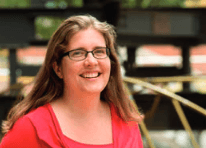“The underlying thing I’m most interested in is using machines as a model to understand people,” she says. “I’m interested in how people communicate and how they form abstract concepts and why we form the abstract concepts we do.”
How people communicate those ideas, and how other people interpret those ideas, is also at the heart of her research. “The words that I use don’t always mean the same thing as those in your mind,” she notes. By using artificial intelligence, researchers can run “very precise experiments” that help uncover answers, she adds.
Wolfe, who received her Ph.D. from the University of Massachusetts, A mherst and joins CEMS from Smith College, will be teaching the theory of computation and introduction to Java. Her goals are to “make the theory of computation a little more fun for people who aren’t into the theory” and to help students learn to code Java. “People often teach it abstractly,” she says. “I want my students to go into an interview and have their interviewers say, ‘This person knows Java.’
